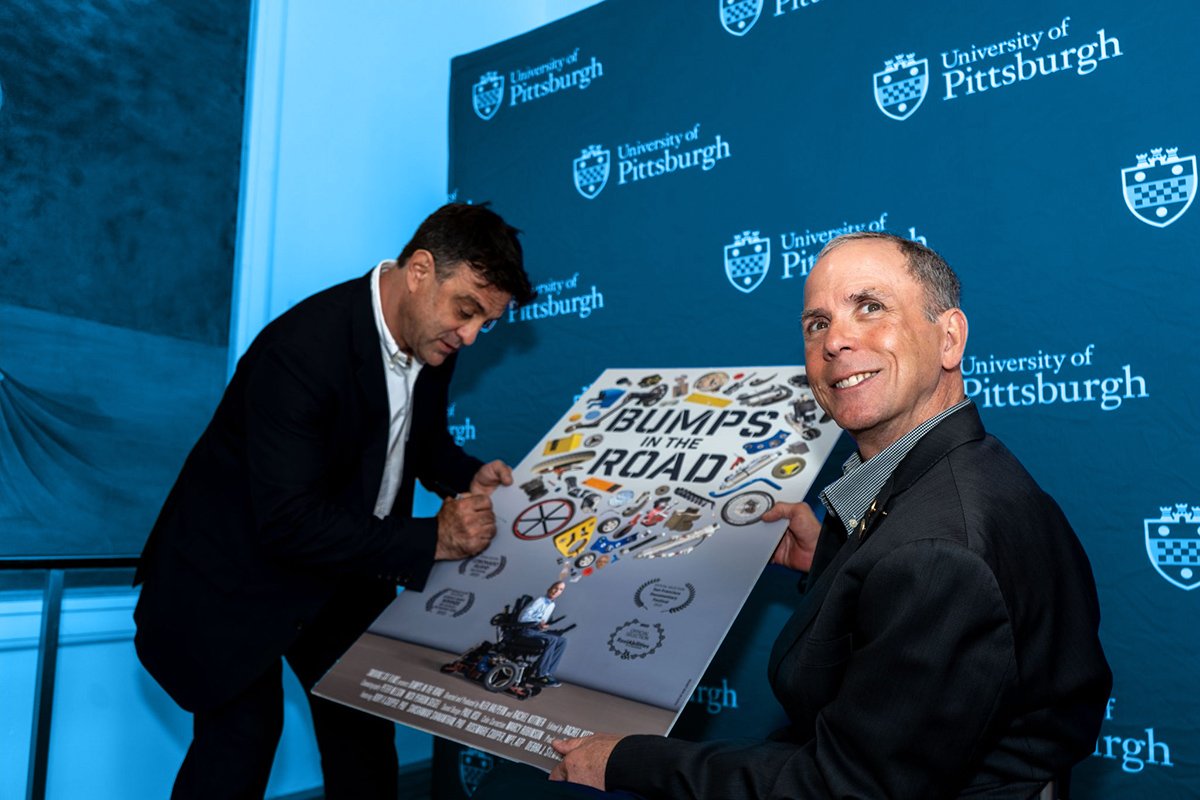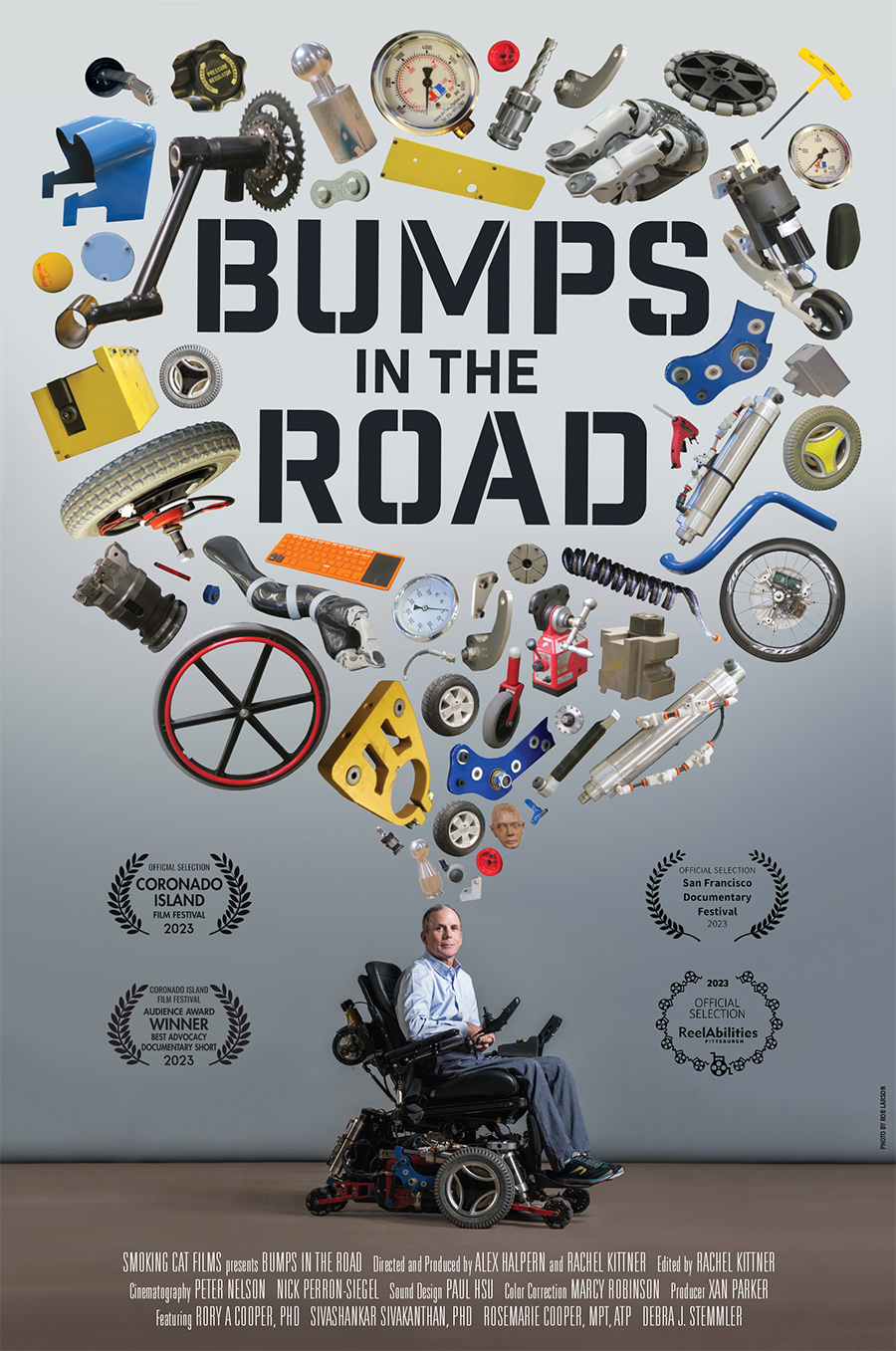By Megumi Barclay

“We’re trying to move the world toward designing with people with disabilities, not for people with disabilities,” Rory Cooper said.
Cooper (pictured right), Distinguished Professor of Rehabilitation Science and Technology in the School of Health and Rehabilitation Sciences (SHRS), known for his innovative work on assistive technologies, was the subject of “Bumps in the Road,” a recent documentary on wheelchair access.
The short film was shown on May 21 at the Frick Fine Arts Building, followed by a panel discussion led by U.S. Marine Corps veteran and acclaimed author Anthony Swofford. Panelists included the film’s directors Rachel Kittner and Alex Halpern (pictured left), colleague Sivashankar “Siva” Sivakanthan, family friend Debra "DJ" Stemmler, and Rosemarie “Rosi” Cooper, associate professor of rehabilitation science and technology, SHRS.
“Bumps in the Road” premiered in the fall of 2023 at the ReelAbilities Film Festival, which shows films by and about people with disabilities. The idea for the 17-minute documentary began when Kittner and Halpern encountered Rory Cooper’s research at the 2016 Cybathlon in Zürich, Switzerland, an annual convention that displays assistive technologies. Initially focused on Cybathlon technology, the directors shifted to highlight Cooper’s life as a researcher and his work leading a team of engineers at Pitt.
The film opens by introducing the Coopers (who are married), detailing their lives and work at Pitt’s Human Engineering Research Labs (HERL) in Bakery Square. Rory is the founding director, and Rosi is the associate director for stakeholder engagement at HERL. Together, they conduct research and develop mobility solutions for people with disabilities, prioritizing accessibility.
The documentary also features perspectives from Sivakanthan, HERL postdoctoral associate, and Stemmler, former Pitt employee—both of whom also use wheelchairs. Sivakanthan discusses working with Rory Cooper on real-world technology solutions, while Stemmler tests the MEBot (Mobility Enhancement Robot), which helped her overcome a fear of ramps following a traumatic bus incident. Their stories emphasize Rory Cooper’s goal of creating technology to solve existing problems.
Rory Cooper, who has used a wheelchair since an accident in the U.S. Army in 1980 left him paralyzed, is at the heart of the film. In addition to serving as Pitt’s inaugural assistant vice chancellor for research for STEM-health sciences collaborations, Rory Cooper is also a Paralympian—with his own trading card—and disability advocate whose work empowers people with disabilities through innovative technology.
He has authored more than 400 peer-reviewed publications and holds more than 30 patents for advanced mobility devices, robotics and assistive technologies. His inventions include a computer mouse for upper limb amputees who use a hook-type prosthetic and the On the Move Pad, a cushioned neoprene wrap for toilet seats, wheelchairs, sports chairs and armrests.
Throughout the film, viewers get a glimpse into Rory Cooper’s life as a professor, inventor and husband, and how technology has changed his experiences of car and air travel. In the panel discussion, he spoke about the recent renewal of the Air Carrier Access Act, which set up greater accessibility goals for airline travel. He is hopeful that future air travel will accommodate all types of wheelchairs and assistive devices.
“Technology currently is the equalizer. It can't do everything for us, but it does start to level the playing field a little bit,” he said.
Rosi Cooper echoed this sentiment, noting that the film’s main message is opening doors for people with disabilities through assistive technologies. “We wanted to make sure the story is not a pity story but that it is a picture of people with impairments, [who are] highly educated and highly motivated...but also, the tremendous impact and how important technology is and how important it is to as the person affected by it to really get involved,” she said.
Currently, “Bumps in the Road” is being shown only at live events but is set to reach audiences via online platforms in the coming year, aiming to ignite discussions, motivate change and promote global efforts toward accessibility.

